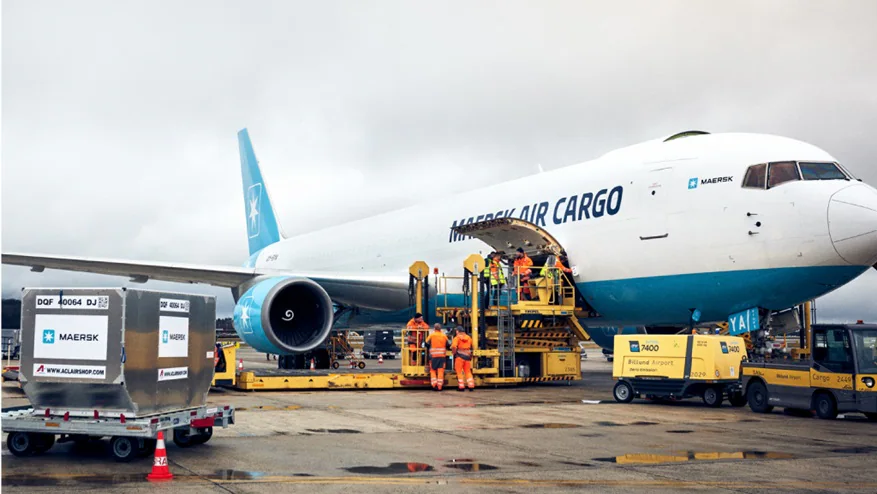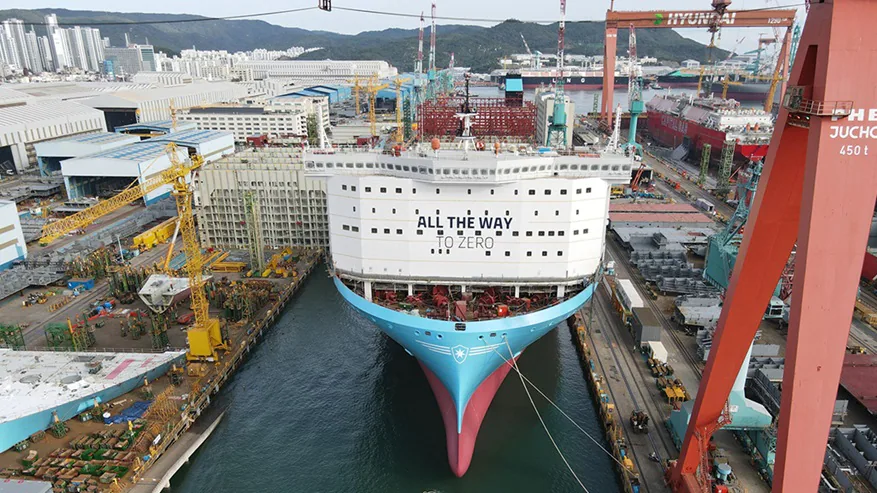Maersk revamped its Maersk Growth innovation unit in June with a new team and a change in how it invests in tech and sustainability.

Part of a company-wide transformation at AP Moller Maersk, the Danish shipping and logistics company, is the overhaul of its corporate venturing unit, Maersk Growth. Much of the old team, including Shereen El-Zarkani, left in the summer of 2023, replaced by new team with a new mandate and operating model.
One of the biggest changes is that Maersk Growth has added venture clienting to the mix of its corporate venturing tools — seeking to partner commercially with a large number of early-stage startups even when it does not take equity in them.
The idea, says Ida Christine Brun, head of external innovation and ecosystem management, is that this will help Maersk adopt new technologies faster, especially in the area of supply chain, where there is growing competition and pressure to meet changing customer demands.
“When we look at supply chain tech, what we were doing before is investing in early-stage startups, with a horizon of three to five years to even have a product. What we’re seeing today with the ever-changing customer needs, and the high pace of technological development is that we require solutions and that collaboration with the startups to happen now,” says Brun.
“We’re pursuing strategic partnerships and non-equity collaborations depending on the type of challenge that we’re trying to solve. That can help us reach that skill and that acceleration faster than it would be going down the investment route,” she says.
Maersk has been been undertaking a company-wide transformation since 2016, turning itself from a shipping company to an end-to-end logistics provider, with everything from airfreight to last-mile delivery options to offer customers. The pace of that transformation accelerated over the past year, as shipping prices fell from Covid-era highs, putting the logistics sector under strain. A new chief executive, Vincent Clerc, came in at the start of the year, and the company is cutting some 10,000 jobs to streamline its operations.
Technology is at the heart of accelerating Maersk transformation, says Alexa Rios Araneda, head of strategic business innovation at Maersk.
“We’re in a very deep transformation, coming from this very traditional shipping line to becoming the integrator of container logistics, providing end-to-end solutions to our customers. And that requires a solid foundation from a tech perspective,” she says.

“If we talk about AI, automation, IoT and visibility and traceability, it is evolving so fast. One of the key challenges is to keep up with those new uses of the technologies.”
Being able to track and monitor goods better is particularly crucial, given that the shipping sector is subject to more and more disruption, whether from geopolitical tensions or extreme weather. In December, for example, Maersk was one of several shipping lines having to reroute vessels away from the Red Sea after coming under attack by Houthi rebels. Later in December fierce winter storms caused containers to be washed off its ships in the North Sea.
“We need to make sure we can be super resilient, because we know that the disruptions are part of the game.”
Alexa Rios Araneda
“We need to make sure we can be super resilient, because we know that the disruptions are part of the game,” says Rios Araneda. “This is such a backstage industry until we get global disruptions like Covid-19, or what’s happening now in the Red Sea, and you see supply chains and transport logistics on the news,”
She is hoping that AI, in particular, might be able to supercharge the organisation’s ability to forecast demand and model complex scenarios — not just collecting data but using that data for insights.
“It is about moving beyond the data, moving the needle from visibility to recommendations to actions,” she says.
Startups that Maersk is already working with include Dexory, a company that uses autonomous robots to capture images of goods in warehouses, giving users visibility on stock levels and location. Maersk invested in Dexory’s series A round in June. The Danish shipping group also works with Pactum, a startup that uses AI to negotiate supplier contracts automatically. Maersk invested in an early-stage round in Pactum at the end of 2022.
Equity investments will focus on sustainability
Using venture clienting to tackle supply chain issues means corporate investment can be fully focused on sustainability. Brun says that Maersk had a realisation that it would need to push harder to be able to keep to 2030 and 2050 emission reduction targets.
“We have a portfolio of 38 companies now, which we will, of course, continue to support with follow-on investments. But when we look at new investments, it’s going to be very focused on the decarbonisation agenda of the company,” says Brun.
Biofuels and green methanol are some of the most immediate focus areas for the team, she says.

“Right now we’re seeing these as the most promising options for achieving significant reductions in greenhouse gas emissions. At the same time we are exploring avenues for improving energy efficiency and investing in the development of future green fuels such as green ammonia and hydrogen. We’re not locked in.”
Investing more heavily in sustainability could mean investing more and backing startups from an earlier stage, says Brun.
“It’s no secret that these companies come at a much greater expense than the more traditional fields. Many of these are still in very early stages of development. We are seeing lower technology readiness levels than we have typically invested in so far,” she says.
A new team structure
Brun and Rios Araneda both joined the revamped Maersk Growth team in June. Both have spent more than a decade at Maersk. Brun, originally from Norway, spent considerable time with Maersk’s oceangoing business, while Rios Araneda, originally from Chile, spent time in the refrigerated business and then at Tradelens, a digitisation project Maersk ran with IBM.
Although previous members of Maersk Growth also had long backgrounds with Maersk, this new team seeks to knit the CVC unit even more tightly to the parent corporation.
“Moving forward, we will be much more business led, and will focus on areas we have pre-identified as requiring innovation for the company and as an industry as a whole,” says Brun.
Brun and Rios Araneda each lead two sides of the innovation unit — internal and external. Brun heads a team of six who liaise externally with startups and innovation ecosystems, scouting ideas, collaboration possibilities and potential investment targets. Rios Araneda, meanwhile, looks inward, liaising closely with Maersk business unit heads and other internal leaders to find out their needs. Her team has just three staff members but seeks to grow.
Brun and Rios Araneda report to Jonas Linnebjerg, head of Maersk Growth, who in turn who reports to Katarina Pohlman, head of strategy at A.P. Moller-Maersk. This makes Maersk Growth part of the Strategy function, a fairly rare set-up for a corporate venturing unit, but ensuring that the unit is very closely aligned with strategic priorities.
The new approach has gone down well with business units, says Rios Araneda. “The appetite to collaborate is growing now that we can go to startups that have a product that they can use straight away rather than waiting two to five years. In a matter of five months, we’ve seen a rise not only in business requests and outreach, but also in how fast the proofs of concept and pilots projects go through,” she says.
“We’ve asked startups what the greatest value we can bring to them as a strategic investor is, and they all say: ‘become our customer’.”
Ida Christine Brun
Startups like Maersk Growth’s new focus on venture clienting, adds Brun.
“We’ve asked startups what the greatest value we can bring to them as a strategic investor or a strategic partner is, and they all say: ‘become our customer and help us grow and expand globally’. That’s what we are now able to provide to a much larger extent and with more companies,” she says.
Just five months in, the new unit is still finding its feet. There’s no set goal yet for the number of startup partnerships it would like to do each year. Measuring success will be a combination of feedback and net promoter scores from both internal stakeholders and startup partners. There will, undoubtedly, be some trial and error around this.
But the interesting thing is that, amid a profound transformation for the whole of Maersk, there was no question of the CVC unit being discontinued, only reshaped. If anything, it is seen as more pivotal than ever, says Rios Araneda.
“Maersk Growth coming closer into Maersk means it is playing a key role,” she says. “Because we were now part of the strategy pillar, we are in a unique position within the organisation.”

Maija Palmer
Maija Palmer is editor of Global Venturing and puts together the weekly email newsletter (sign up here for free).








